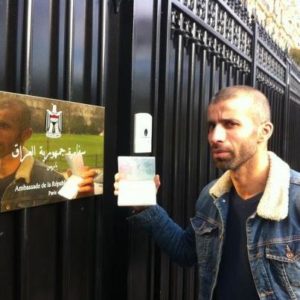By Justin Dorman
Impunity Watch Reporter, Middle East
BAGHDAD, Iraq – French-Australian journalist, Nadir Dendoune, was arrested in Iraq for taking pictures in a restricted area of Baghdad without formal permission. Dendoune, who had first entered Iraq on January 16th, has been held in detention since January 23rd. Iraqi government officials claim that the journalist for the Le Monde Diplomatique is healthy, and that his case is still being investigated.

The Committee to Protect Journalists, who admonishes the Iraqi government’s actions, claims that the arrest was a result of Iraq’s 2011 media law which places a series of impediments between journalists and the ability to gain information.
Sherif Mansour, a spokesman for the Committee to Protect Journalists further stated that, “[t]he arbitrary jailing of a journalist is a vestige of the Saddam Hussein regime that is completely out of place in Iraq’s democracy today.”
Iraqi officials have stated that Dendoune had lacked the requisite permits to take photographs by the water treatment plant in the southern Dora district. “[He] did not tell authorities about his activities, and did not ask for authorization to take photos,” said such official.
Those who support Dendoune, have not been sitting idly by and waiting for his release. Patrick Le Hyaric, Director of Humanity, has written letters to Viviane Reding, the Commissioner for Justice, Fundamental Rights and Citizenship and Vice-President of the European Commission, to Catherine Ashton, High Representative of the Union for Foreign Affairs and Security Policy, and to Fareed Yasseen, the Iraqi Ambassador in France.
The embassy has been working diligently with Iraqi officials to ensure that Dendoune has the healthiest of detention conditions and to find out why he is seemingly being arbitrarily held. Despite requests made by the embassy, Dendoune has been denied any consular visitation.
Additionally, a Facebook page was created by Dendoune’s family and friends, with articles, pictures, and information for support rallies, which aim to shed light on Dendoune’s situation. Others who have demanded the release of the journalist from arbitrary detention include Reporters Without Borders, the Iraqi Civil Society Solidarity Initiative, and the National Union of Iraqi Journalists.
The Journalistic Freedoms Observatory points out that this is not the first time that the Iraqi government has detained a foreign journalist. Just last year, Daniel Smith, an American journalist was arrested and held for five days before he was granted release by order of the Prime Minister.
For further information, please see:
Guardian – Journalist Arrested in Iraq for Taking Photos – 31 January 2013
Iraqi Civil Society Solidarity Initiative – Immediate Release of Nadir Dendoune, Respect Freedom of Press and More Protection for Journalists Working in Iraq – 31 January 2013
Radio France International – Nadir Dendoune, un Journaliste Engagè Dètenu en Irak – 31 January 2013
Committee to Protect Journalists – International Journalist Detained in Iraq for a Week – 30 January 2013
Facebook – Comitè de Soutien Pour la Libèration de Nadir Dendoune – 30 January 2013
L’Humanitè – Patrick Le Hyaric: “Libèration Immèdiate Pour Notre Confrè Nadir Dendoune” – 30 January 2013
